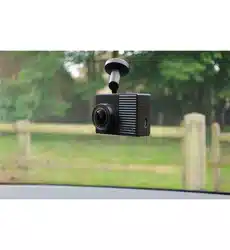Loading ...
Loading ...
Loading ...

2
Route the power cable to your vehicle power outlet.
You can use either of the included cables to provide power to
the camera. The longer, lightweight power cable is designed
to be routed out of sight. To hide the 4 m (13 ft.) cable, route
it behind the vehicle trim along the windshield, doorframe, or
dash.
3
Plug the Garmin Dash Cam power cable into the included
power adapter.
4
Plug the power adapter into a power outlet in your vehicle.
5
If necessary, turn on the vehicle ignition switch to provide
power to the power outlet in your vehicle.
The device turns on.
Setting the Camera Placement
You can mount the device in the left, center, or right of your
windshield. For the best performance, you should set the
Camera Placement option to indicate the location of your device
in the vehicle.
1
Select Settings > Driver Assistance > Camera Placement.
2
Select Horizontal Placement, and select the horizontal
placement of your camera.
3
Select Vehicle Height.
4
Select an option:
• If you are driving a large vehicle, like a full size van or
truck, select Tall.
• If you are driving a car, select Normal.
Turning On the Device Manually
Before you turn on the device using battery power, you should
fully charge the battery.
NOTE: When the device is connected to an ignition-switched
power outlet, it turns on automatically when you turn on the
vehicle.
Select .
The device turns on.
Turning Off the Device Manually
NOTE: When the device is connected to an ignition-switched
power outlet, it turns off automatically when you turn off the
vehicle.
Hold for 3 seconds.
The device turns off.
Main Menu
From the viewfinder, press or to scroll through the main
menu, and press to open a menu item.
Gallery: Allows you to view and manage recorded video and
photos (Viewing Videos and Pictures, page 3).
Travelapse: Allows you to start and stop Travelapse
™
recording
(Travelapse, page 3).
Voice Control: Allows you to enable and disable the voice
control features (Voice Control, page 5).
Garmin Drive App: Allows you to pair your camera with your
smartphone and the Garmin Drive
™
app (Pairing with Your
Smartphone, page 5).
Settings: Allows you to set up camera features, change system
settings, and view system information (Settings, page 6).
Dash Cam Recording
NOTICE
Some jurisdictions regulate or prohibit use of this device. It is
your responsibility to know and comply with applicable laws and
rights to privacy in jurisdictions where you plan to use this
device.
The dash cam records video to the camera memory card
(Installing a Memory Card, page 1). By default, the device
immediately starts recording video when it turns on, and it
continues recording until it is turned off. If the memory card is
full, the device automatically deletes the oldest unsaved video to
create space for new video.
When the option to promptly delete unsaved video is enabled,
the device continually deletes unsaved video more than three
minutes old and deletes all unsaved video each time it is
powered off. This feature is available only for specific regions
and is enabled by default for some of those regions. When the
camera is set to a supported region, you can enable or disable
this feature in the camera settings (Camera Settings, page 6).
You can save a video recording to prevent it from being
overwritten or deleted (Saving Unsaved Video Footage,
page 3).
Saving a Video Recording
By default, the device uses a sensor to detect a possible
incident and automatically saves video footage before, during,
and after the detected event. You can also save video files
manually at any time.
Hold .
The device saves the video footage before, during, and after
you hold .
The memory card has limited storage. After you save a video
recording, you should transfer the recording to your computer
(Videos and Photos on Your Computer, page 3) or to your
smartphone (Trimming and Exporting a Video, page 5).
Event Detection
By default, the device uses a sensor to detect possible incidents
and saves video footage automatically before, during, and after
the detected event. The video footage is stamped with the time,
date, and location of the event.
2 Dash Cam Recording
Loading ...
Loading ...
Loading ...
